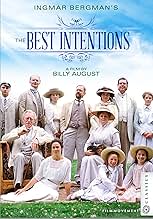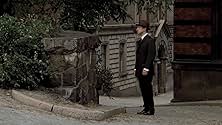Füge eine Handlung in deiner Sprache hinzuIn 1909, poor theology student Henrik falls in love with Anna, the intelligent daughter of a rich family in Uppsala. After marrying Henrik becomes a priest in northern Sweden. Urbane Anna ha... Alles lesenIn 1909, poor theology student Henrik falls in love with Anna, the intelligent daughter of a rich family in Uppsala. After marrying Henrik becomes a priest in northern Sweden. Urbane Anna hates living in the county, growing restless.In 1909, poor theology student Henrik falls in love with Anna, the intelligent daughter of a rich family in Uppsala. After marrying Henrik becomes a priest in northern Sweden. Urbane Anna hates living in the county, growing restless.
- Auszeichnungen
- 4 Gewinne & 7 Nominierungen insgesamt
Handlung
WUSSTEST DU SCHON:
- WissenswertesThe first time a husband and wife both won awards at the Cannes Film Festival in separate categories for the same film, Bille August winning the Palme d'Or for Best Film and his wife Pernilla August winning for Best Actress.
- PatzerKarin Åkerblom is wearing her glasses while reading out the letter from her daughter to her husband. When the camera zooms to a head shot of Karin, the glasses are gone.
- Zitate
[last lines]
Henrik Bergman: So, you don't want us to go on?
Anna Bergman: You know I do. I want nothing else. That is all I want.
- Alternative VersionenTheatrical release is edited down from a six-hours miniseries developed for Swedish television.
- VerbindungenEdited from Den goda viljan (1991)
That being said, it's also not technically a Bergman film, but directed through Billie August with maybe a slightly differed sensibility. Yet it's not by that much, aside from specific choices in the music (I don't think Bergman would have used the musical accompaniment, not that it's bad but it tells of what is usually different and less frequent for the material), and because of the nature of the material and the characters, it's not surprising if the Best Intentions feels more like a Bergman film than August. The rhythm of the acting, too, feels like it still is out of those vintage masterpieces of the 60s and 70s. Here we're given the story of how Henrik (Samuel Froler) and Anna (Pernilla August) came to be husband and wife. It's basically in two halves- the first dealing with Karin Akerblom (Ghita Nørby), Anna's mother, and her dire attempts to keep the two away from one another. And at first Anna agrees, but soon the attachment to one another can't be broken, even through an early affair Henrik has with a waitress and Anna's tuberculosis scare.
Many specific scenes, like a very harsh (though always under the surface) scene between Karin and Henrik, when she tells him point blank to leave and never come back to see Anna, or when Anna is told after the death of her father Johan (Max Von Sydow, always great to see him even in limited time) about how she destroyed a letter she found that she meant to sent to Henrik. So much of this is so powerful for how all of the dialog, all of the little notes and emotion in the action penetrate to the core elements of the drama. Sometimes I felt like I was seeing even deeper truths being reached about parents and children (not only Anna with her mother but Henrik with his family- both have tarnished relationships, but however much forgiveness is left off or ties severed shows also how the children become as they are), and a take on the free will vs. determinism of such a decision. So all of this is always fascinating, seeing this 'version' of Bergman's parents and their struggles to be together- Henrik the sort of cold yet compassionate loner parish/priest, and Anna the very warm and heartfelt soon-to-be-mother- as they both have head-strong tendencies.
I can't say how much of what unfolds in the 2nd act holds up as being totally true to what Bergman's parents lives were, but then who could? It's all made for dramatic sake, anyway, but what ends up sticking most is the friction in their marriage early on, when they move away to a small, working-class village where Henrik wants to work as the village pastor. It's in this section that the flaws arise, but not big ones, only enough to keep it odd yet intriguing. Like the character of Petrus, who is a weird little trouble-maker who is too sickly and frustrated to live with his parents, so Henrik and Anna take him in, which turns out disastrously. But there needs to be either more context with this character (and, indeed, a version of this film- a mini-series for Swedish TV- is double the length), or nothing at all, as everything that needs to be said about the strife in the two of them is actually there in the sub-plot with the angered villager Nordenson. And with the ending, it's satisfying, in a catharsis way though it's not as great, or even perfect, an ending it could have been had a certain decision been made on Henrik's part when he sees Anna outside.
I won't mention what, but it doesn't matter at any rate. What makes The Best Intentions a gem in the Bergman cannon is his trust in the audience to take these 'characters' as full-on human beings, who have the utmost trouble with one thing, compromise and the real meaning of love for one another- connection, which is what Bergman goes for in most of his films. And helping this greatly are the main actors, who elevate an argument mid-way through (regarding the location of the wedding) to the powerful terrain it's reaching for. August fits the requirements of her character just as Froler does, even if Froler ends up being slightly more constricted due to the nature of his own self-restrictive and hard-pressed priest. In the end, The Best Intentions makes wonderful use of autobiography for the stuff of an often gut-wrenching romantic drama where the personal goes into the theatrical, and the direction and acting brings out the best in Bergman's voice in his golden-age.
- Quinoa1984
- 22. Dez. 2006
- Permalink
Top-Auswahl
- How long is The Best Intentions?Powered by Alexa
Details
- Erscheinungsdatum
- Herkunftsländer
- Sprache
- Auch bekannt als
- The Best Intentions
- Drehorte
- Produktionsfirmen
- Weitere beteiligte Unternehmen bei IMDbPro anzeigen
Box Office
- Bruttoertrag in den USA und Kanada
- 1.253.106 $
- Eröffnungswochenende in den USA und in Kanada
- 15.186 $
- 12. Juli 1992
- Weltweiter Bruttoertrag
- 1.253.106 $
- Laufzeit3 Stunden
- Farbe
- Seitenverhältnis
- 1.78 : 1
Zu dieser Seite beitragen






































